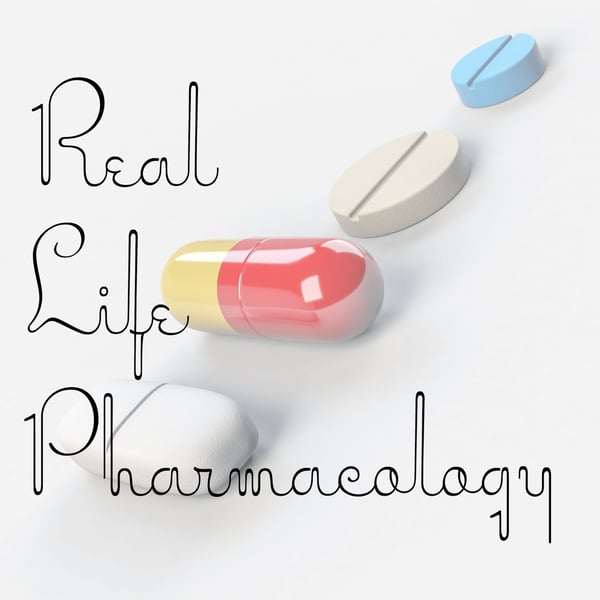Rivastigmine Pharmacology
Real Life Pharmacology - Pharmacology Education for Health Care Professionals
Eric Christianson, PharmD; Pharmacology Expert and Clinical Pharmacist
5 • 716 Ratings
🗓️ 28 May 2020
⏱️ 14 minutes
🧾️ Download transcript
Summary
Weight loss is a potential adverse effect of rivastigmine. It is important to monitor weights.
Anticholinergic medications such as diphenhydramine can blunt the effects of rivastigmine.
Rarely, acetylcholinesterase inhibitors like rivastigmine can cause bradycardia.
Transcript
Click on a timestamp to play from that location
| 0:00.0 | Hey all, welcome back to the Real Life Pharmacology podcast. |
| 0:03.6 | I'm your host, Eric Christensen, FarmD, BCPS, BCGP. |
| 0:08.8 | And today what I'm going to cover is rivestigmin. |
| 0:14.0 | Rivestigmin is an acetylcholine esterase inhibitor. |
| 0:18.3 | So I have covered Dinepazil. |
| 0:24.1 | That's another acetylcholine esterase inhibitor in the same class. But I did want to cover rivistigmin specifically because there are a couple of quirks that definitely are |
| 0:31.7 | different. And I can share my clinical practice experience with this medication as well. So being in this class as a refresher, |
| 0:41.7 | acetylcholine esterase inhibitors prevent the breakdown of acetylcholine. And it's theorized that a deficiency |
| 0:51.8 | in acetylcholine in the brain leads to certain forms of dementia, |
| 0:57.3 | Alzheimer's as well as potentially a component of Parkinson's type dementia as well. |
| 1:03.0 | So with that, with this drug, we're trying to prevent the breakdown of that acetylcholine |
| 1:10.3 | and increase concentrations in the brain |
| 1:12.9 | and potentially help manage the symptoms of certain types of dementia. |
| 1:19.6 | Very, very important to remember that this drug does not reverse dementia. |
| 1:25.7 | So sometimes that's an expectation of patients, caregivers, |
| 1:32.3 | you know, friends, family, that dementia medications can potentially help reverse this, or they'll be, |
| 1:39.5 | you know, totally 100% back to normal. And we know from the studies and evidence that that's absolutely not going to be |
| 1:47.0 | the case. So definitely coach and educate patients that this isn't going to reverse their dimension. |
| 1:56.6 | They're not going to be totally back to the way they used to be. However, if we can give them a little |
| 2:02.2 | bit more capacity for memory and some of the symptoms that go along with dementia, that can |
| 2:08.2 | certainly be helpful and be comforting to some there. So that's the mechanism in short there. |
| 2:18.9 | Doseage forms, this is kind of one of the big differences with denepazil |
... |
Transcript will be available on the free plan in -1767 days. Upgrade to see the full transcript now.
Disclaimer: The podcast and artwork embedded on this page are from Eric Christianson, PharmD; Pharmacology Expert and Clinical Pharmacist, and are the property of its owner and not affiliated with or endorsed by Tapesearch.
Generated transcripts are the property of Eric Christianson, PharmD; Pharmacology Expert and Clinical Pharmacist and are distributed freely under the Fair Use doctrine. Transcripts generated by Tapesearch are not guaranteed to be accurate.
Copyright © Tapesearch 2025.

